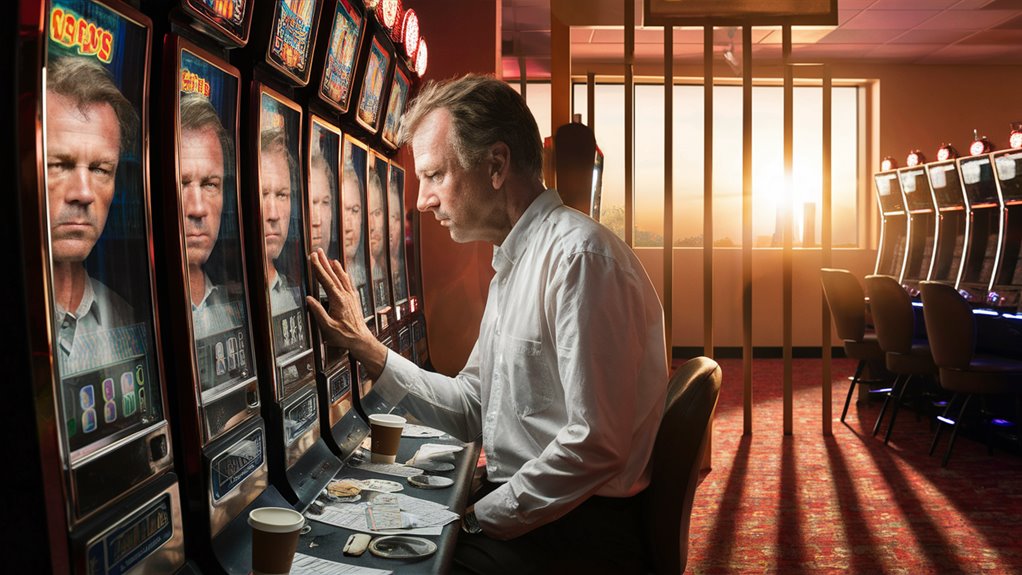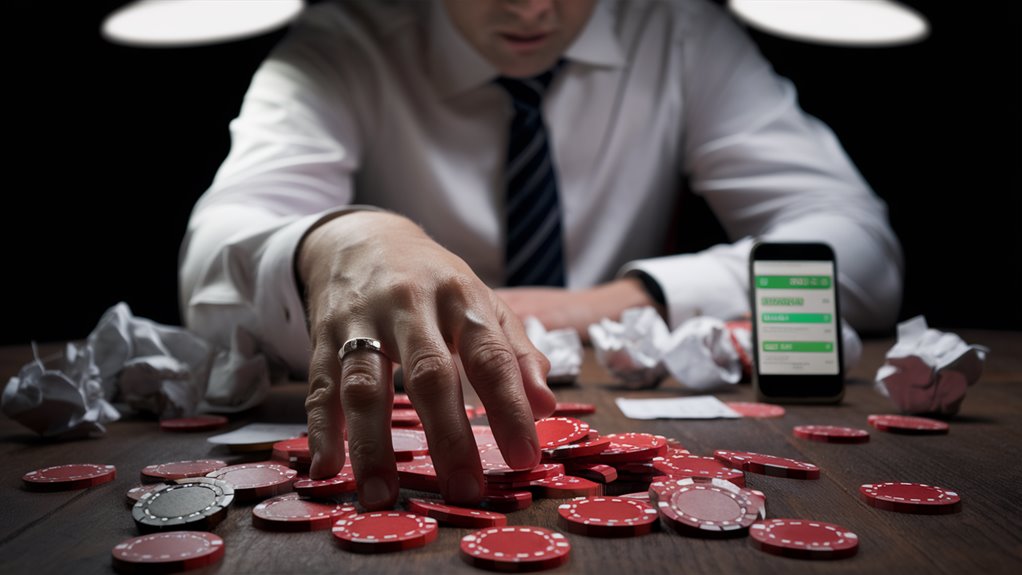
The Mind Game of Gambling and How to Handle It

Know the Brain Tricks
Problem gambling changes the brain’s work by making more dopamine, setting strong brain paths and habits. This brain rewiring messes up the brain’s own happy feeling system, so daily fun things feel less good. Gamblers need bigger bets and more risks to feel the same joy as before.
Warning Signs and Dangers
Actions to Watch
- Money problems and growing debts
- Lying about gambling
- Quick mood changes
- Pulling away from loved ones
- Constantly thinking about gambling
Shifts in Feelings
- Losing interest in fun activities
- Trouble making choices
- Wrong thoughts on gambling odds
- Can’t stop gambling Splitting Bets for Balanced Casino Performance
- Needing gambling to deal with stress
Proven Ways to Recover
Tools to Use
- Add software that blocks gambling
- Set limits on your money
- Turn on website filters
- Use apps to limit screen time
Help to Lean On
- Join groups with the same problems
- Go to Gamblers Anonymous
- Join recovery circles
- Make check-in buddies
Get Professional Help
- Try cognitive therapy
- See addiction experts
- Look at medicine options
- Make personal recovery plans
New Habits
- Find new fun activities
- Learn how to manage stress
- Keep track of money
- Fix broken relationships
- Start new hobbies
Know the Addictive Brain Tricks
The Brain Science of Gambling
Problem gambling hits deep in the brain’s happy system. It fires up parts of the brain that make you crave for more and more.
When you gamble, your brain throws out dopamine, which makes you feel great. This gets stronger over games, even if you almost win.
The need for this happy feeling can grow and make you take even bigger risks.
Detailed Brain Effects
Gambling affects more than just dopamine. It can mess with serotonin and norepinephrine too, which help control mood, judging right from wrong, and impulses.
Too much gambling makes your brain’s normal reward system tired, needing bigger risks for the same happy feeling.
Brain Choices
As the brain changes, making good choices can get harder. This is because the part of the brain that helps with this shows less action when you gamble a lot.
These changes may keep you gambling even when you lose money.
Brain Chemistry and Actions
This tricky ball of feeling and gambling can spin into a hard-to-break cycle of a strong need to gamble more and more.
Signs of Gambling Issues
See the Signs of Gambling Woes
Actions That Show a Problem
Problem gambling shows clear warning signs that need fast attention.
Watching bets grow hints at trying to make up for lost money or keeping the thrill.
Secret actions or hiding gambling from loved ones is a big red flag.
Money trouble signs include borrowing or selling stuff to keep gambling.
Feelings and Mind Signs
These signs show as changes in how one acts day-to-day.
Watch for neglect of work or family because of gambling thoughts.
Feeling restless or irritated when trying to stop gambling is common.
Still gambling even when it hurts your life or costs a lot?
Soon-to-see Signs and Help
If someone’s feelings swing a lot, it might mean gambling issues.
Going from happy at wins to very sad at losses can happen. Enchanting Table Dynamics With Strategic Bluffs
Sleep troubles, big money loss, or hurt in relationships mean it’s time to get help.
Take Steps
Seeing three or more signs means it’s time for pro help.
Moving from just for fun to can’t stop can happen fast, but quick help can make recovery better.
Many see problem gambling as a real health issue, not a bad step.
Digital Gambling Today
Risks in Today’s Digital Gambling

The New Ease of Online Bets
How we bet has changed, making it easy and risky.
Online gambling sites go all day, every day. They let you play from phones or computers. This non-stop play, with quick pay systems, takes down old walls and can mean faster big money losses.
How Tech Tricks us
The smart tech in gambling sites catches us exactly where we’re weak. They use:
- Almost winning moments
- Changing prize plans
- Groups saying ‘yes’ to bets
These tricks fire up dopamine and hook you deeper into betting.
Mixing game features with betting, like with loot boxes or game coins, brings in more young people and makes rule-making tough.
Digital Bets: The Dangers
Betting online hides who you are and you’re alone. Risks include:
- Hiding how much you bet
- No one stopping you Weaving Fragile Leads Into Lasting Blackjack Edges
- Unknown game runners
- Risks with digital money bets
- Traps in bonus offers
These make it hard to break away from gambling.
The ways we bet keep changing, asking for new rules and ways to keep us safe.
Keeping Safe Online
You need protections like:
- Watching your account
- Can say ‘no more’
- Limits on what you can spend
- Check if you’re old enough
- Tools for responsible bets
Getting Out of Forced Betting
Path Away from Forced Betting: Full Recovery Plan
Know and Beat Gambling Addiction
Barriers Help
Start recovery by setting strong no-go lines:
- No more casinos or betting shops
- Put blocking software everywhere
- Let someone you trust handle your money
- Get rid of betting apps and block gambling content
Treatment Paths That Work
Therapy helps a lot with gambling issues.
Big parts of healing include:
- Change how you think of betting
- Build ways to cope
- Handle what triggers your bets
- Make plans to stay well
Gather Your Support Crew
Staying away from bets needs strong support:
- Keep going to meetings
- Work with gambling experts
- Join family sessions
- Have buddies to check on you
Money Steps to Stay on Track
Set clear money rules to stop falling back:
- Pay bills on time, all set up
- Save where you can’t easily spend
- Plan out paying back debts
- Set a money limit every day
Getting a Grip on Triggers
Know and handle what pushes you to bet:
- Watch how you feel
- Plan your time well
- Pick other fun things to do
- Learn how to chuck stress
Mix Many Ways to Heal
Use a few healing ways for the best shot at getting better:
- One-on-one talks
- Join group sessions
- Get your family to help
- Check how you’re doing and tweak plans
Set Good Game Limits
Money Rules in Games
Clear money lines help make sure games stay fun.
Set a hard spending cap and watch your game cash closely.
Know every penny you put into games to keep from going over.
Plan Your Game Time
Having a plan helps balance play and keep it from taking over.
Set a game plan with set times and use timers to stick to it.
Choose skill games over luck to keep fun up and costs down.
Stay in Charge and Check In
Keep your game habits in check by:
- Never use borrowed money for games 먹튀검증커뮤니티 온카스터디
- Skipping games when upset
- Finding other fun stuff to do
- Having friends help watch you
- Asking for help when you struggle
Swap game spots for fun places with friends who get your limits.
Set clear steps to see and fix any slip in rules through regular talks.
Lasting Game Ways
Focus on games for fun, learning, and being with friends, not the money.
Set clear signs and plans to keep gaming healthy and fun long-term.


